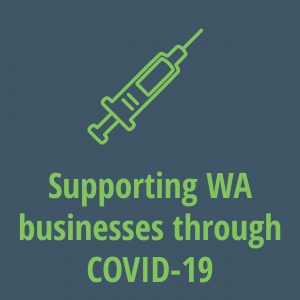WA’s reopening to all of Australia and the world has been firmly pegged to a high uptake of the COVID-19 vaccine.
While mandatory vaccine orders are in place for most of the State’s workforce, what if your business falls outside of the list of occupations? And how do you implement the mandatory directive? Our experts explain.

Mandatory vaccination rules
Mandatory vaccination rules apply to 75 per cent of the WA workforce — more than 1 million workers — and are being rolled out according to three groups.
Group 1 and Group 2 workers, as designated under public health orders, are required to have two doses of the vaccine by December 31, 2021, and January 31, 2022. Group 3 workers are required to be fully vaccinated in the event of a lockdown or similar restrictions.
In addition, any worker who falls within the previous vaccine mandates for Group 1, Group 2 and Group 3 industries must also receive a booster vaccination to be deemed “fully vaccinated”.
CCIWA has released two updated guides for businesses on WA’s mandatory vaccines.
Employees are required to provide evidence of vaccination to employers, who need to maintain these records.
Penalties for non-compliance will be up to $100,000 for employers and up to $20,000 for individual employees.
CCIWA Workplace Relations Director Ryan Martin says a government direction offers businesses some level of comfort around being able to provide reasonable and lawful directions to their employees to comply with the rules.
“However, they will still need to ensure that they afford procedural fairness to their employees and do not fall foul of discrimination laws,” he adds.
He notes that while the question of whether directing employees to comply with the government rules around COVID-19 vaccinations is lawful and reasonable has not yet been tested in a court or tribunal, recent case law dealing with dismissals for refusing directions related to the flu vaccine suggest that if employers have taken necessary steps it is likely such a direction will be reasonable.
“These include undertaking risk assessments, consulting their workforce, implementing a vaccination policy and having processes in place to deal with legitimate objections to vaccination,” he says.
What about other occupations?
If your business doesn’t fall into an industry subject to a government health order, then there are other processes you can follow.
In order to make vaccinations mandatory in your workforce, you will either require written agreement with employees for them to be vaccinated, or it needs to be a lawful and reasonable direction.
Whether an employer needs to include mandatory vaccination as a control measure to comply with their work health and safety duties is highly fact dependent and takes into account the workplace, which will likely require a work, health and safety (WHS) risk assessment, and each employee’s particular circumstances.
Furthermore, it will depend on the particular circumstances at the time the WHS risk assessment is undertaken.
Employers need to:
- Determine the current risk by undertaking a risk assessment, and
- Determine if COVID-19 vaccines are a “reasonably practicable” control measure for the workplace.
Workers are required to comply with reasonable and lawful directions from their employer, which includes directions intended to protect the health and safety of employees and customers.
Requiring your staff to stay home if unwell, get a COVID-19 test or self-isolate are classified as reasonable directions.
Safe Work Australia advises that under Work Health and Safety laws, you have a duty “to eliminate, or if that is not reasonably practicable, minimise the risks of COVID-19 in the workplace so far as is reasonably practicable”.
“Employers also have a duty to consult workers regarding COVID-19 risks and how these risks are to be managed. This includes the introduction of workplace policies relating to vaccination.”
The Safe Work Australia advice states that businesses “must also comply with any public health orders made by state and territory governments that apply to you and your workplace, including those mandating vaccination of particular workers”.
In addition, to reduce risks such as COVID-19 in the workplace, you must:
- Undertake a risk assessment for your business;
- Consider the available control measures and how they will help manage the risks of COVID-19, including any available vaccines;
- Consult with workers and health and safety representatives about COVID-19 and relevant control measures, including COVID-19 vaccines;
- Consult, co-operate and co-ordinate, so far as is reasonably practicable, with any other duty holders.
- Determine what control measures are reasonably practicable for you to implement in your workplace.
Whilst public health and safety have been the primary drivers for requiring employees to be vaccinated, it is not the only basis on which a lawful and reasonable direction may be made.
Depending upon the nature of your organisation, there may be other factors that mean it is important that all or most of your staff are vaccinated.
“If you are looking to ensure your workforce is vaccinated going forward, then for new employees you can include a term in your employment contracts to this effect, similar to the requirement to have a working with children clearance or driver's licence,” says Martin.
However, before making these decisions you will need to seek legal advice to ensure:
- The term complies with anti-discrimination laws;
- You have a process to deal with refusals, including consideration as to the reasons for refusal; and
- You have considered the ongoing practical implications of making vaccination a term of employment.
For guidance, contact CCIWA Employee Relations Advice Centre on 9365 7660 or [email protected].
Vaccines and employee privacy is governed by the Privacy Act.
In general, you can ask their staff if they have been vaccinated against COVID-19, and where a mandatory vaccination requirement applies employees may be required to provide that information. However, the collection, use and disclosure of information must be handled in accordance with Australian privacy law.
Employers should ensure that they:
- Accurately record the information collected, keep it up-to-date and store it securely.
- Limit the use and disclosure of employee vaccination status information to what is necessary to prevent and manage COVID-19. Employers should not disclose vaccination status among colleagues unless there is a legitimate and compelling reason to do so.
- Regularly review whether this information needs to beretainedas the vaccination roll-out progresses and more people receive the vaccine. This should include, for example, monitoring the latest government health advice about the vaccine roll-out and COVID-19 restrictions.
For more see: CCIWA's guides to vaccinations
How you respond to an employee who refuses to comply with a direction to get the COVID-19 vaccination will depend on all of the circumstances, including the reason (if any) for the refusal.
The steps taken will depend on whether the requirement is as a result of a public health order, contract of employment or other lawful and reasonable direction given by the employer.
Employers should have clear policies and procedures for managing employees who refuse or seek to be exempt from mandatory vaccination policies.
Some of the factors that will need to be considered include:
- Why hasn’t the employee been vaccinated?
- Is the employee prepared to be vaccinated at a later point in time?
- Does a relevant medical or other exemption apply to the employee?
- Is it reasonable for the employee to perform other duties? and
- Are other options available, such as working from home?
"Enforcing compliance with any vaccination requirement should be carefully managed,” says Martin.
“The best way to ensure your business is compliant with the government directions, occupational health and safety obligations and workplace laws, including those around discrimination, is to have a carefully worded vaccination policy in place.”
For more see: CCIWA's guides to vaccinations
In August the Federal Government announced a no-fault COVID-19 Vaccine Claim Scheme, which gives Australians quick access to compensation for claims related to the administration of the COVID-19 vaccine.
The scheme will cover the costs of injuries above $5000 to a proven adverse reaction from the vaccine.
Compensation under the scheme has been available since September 6, 2021. Claims can be backdated to February 2021.
For general advice on your individual situation call CCIWA’s Employee Relations Advice Centre on (08) 9365 7660 or via [email protected].
For legal advice specific to your situation, contact our team of Workplace Relations lawyers on (08) 9365 7746 or via [email protected].







